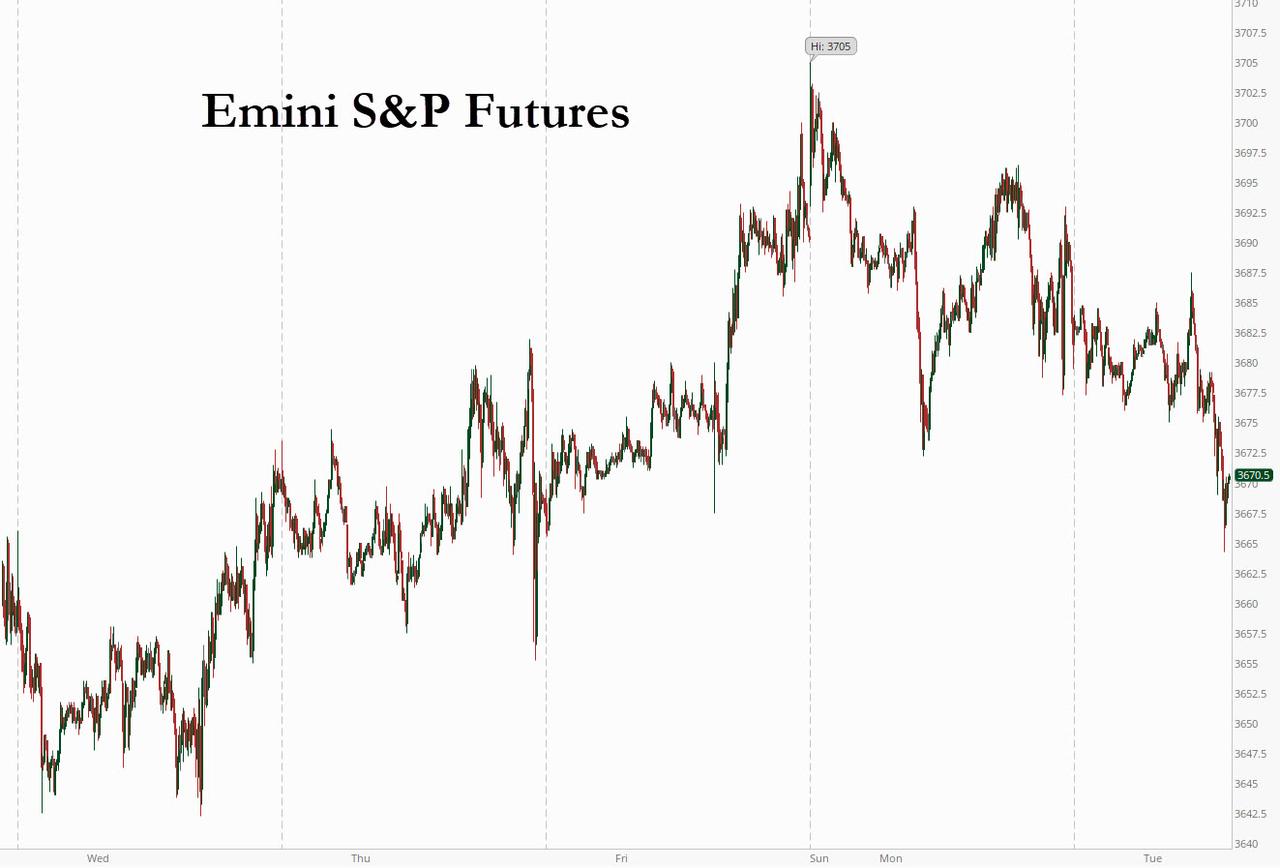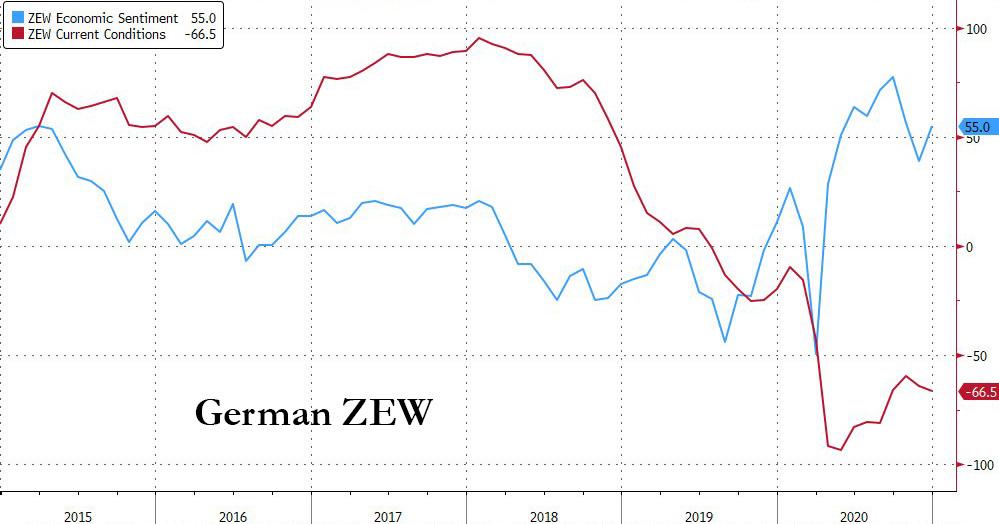Futures Slide On Lack Of Stimulus Deal Progress, Vaccine Disappointment
Global markets dropped for a second day and US equity futures fell as optimism that a fiscal stimulus deal would quickly pass in Congress fizzled and as investor focused on a rise in coronavirus infections and ever tougher lockdowns threaten to shutdown year-end holidays. A $5 billion "at the market" equity offering announcement by TSLA pushed futures to session lows.
At 7:20 a.m. ET, Dow e-minis were down 148 points, or 0.5%, S&P 500 e-minis were down 19.50 points, or 0.52%, and Nasdaq 100 e-minis were down 45.5 points, or 0.38%. Among individual stocks, Stitch Fix surged 36% pre-market after reporting fiscal first-quarter profit and revenue that beat analyst estimates for the heavily-shorted personal-styling company. Tesla (TSLA) fell 2.8% premarket after it unveiled plans to raise up to $5 billion in a Goldman-led stock offering, just days after Goldman (GS) upgraded the stock from Neutral to Buy.
"You saw more than a slight moderation to the S&P 500, and the Dow, but you’re still looking at these markets at record highs," said Tom Piotrowski, a market analyst with CommSec. "It’s a matter of looking out for what the next catalyst is for these markets."
In Europe, travel, retail and health care stocks led declines following a slump in Asia after Hong Kong announced it would start implementing some of its strictest social distancing measures since the pandemic began. The Stoxx 600 dropped 0.5%, with CAC 40 the regional underperformer. German sentiment, as measured by ZEW expectations survey, posted a modest rebound even as current conditions continued its slump deeper into negative territory.
Earlier in the session, MSCI’s broadest index of Asia-Pacific shares ex-Japan narrowed its losses from early trade, but was still down 0.07% as anxiety over the coronavirus pandemic capped sentiment. Among Asia’s top markets, Australian shares closed higher for a sixth straight session, lifted by data showing an improvement in business sentiment. The S&P/ASX 200 index rose 0.2% to 6,687.7, adding about 3% in the past six sessions. However, Japan’s Nikkei 225 dipped 0.22% and Seoul’s Kospi lost 1.53%. Chinese blue-chips were down -0.2% with Hong Kong’s Hang Seng sliding 0.8%, as Sino-U.S. tensions continued to weigh on the market.
Chinese Foreign Minister Wang Yi assured U.S. executives that Beijing remained committed to the Phase 1 trade deal with the United States. That came as a report showed China’s purchases of U.S. goods and services as of October, specified in the Phase 1 deal at $75.5 billion for 2020, was about half the level they should be on a pro-rated annual basis.
The S&P 500 and the Dow fell on Monday, but the Nasdaq closed at record levels as investors unwound the reflation trade and rushed back to technology mega-cap stocks which have thrived from the pandemic-induced shift to work from home. Positive developments related to the COVID-19 vaccine helped investors in recent weeks look past the surge in infections and raise bets on a swift economic recovery next year but news that Pfizer (PFE) told administration officials that it cannot supply substantial additional vaccines until late June or July, hurt sentiment.
"Signs that traders have trimmed risk are there, with some focus on U.S. COVID trends,” Pepperstone head of research Chris Weston wrote. Renewed focus on trade tensions and the ongoing Brexit negotiations, suggests “this selective mindset is just the market sitting on its hands waiting for the next shoe to drop.”
Residents in California, the nation’s most populous state, faced new restrictions on Monday after record case numbers and hospitalizations, while officials in New York warned similar restrictions could come into effect soon. Nationwide, COVID-19 infections are at their peak, with an average of 193,863 new cases reported each day over the past week according a Reuters, and health officials warned that the worst is yet to come.
Traders are also closely watching whether Congress will be able to clinch an agreement on a long-awaited COVID-19 relief bill and a $1.4 trillion spending bill, with Friday eyed as a possible deadline to avoid a government shutdown. While hopes for another U.S. stimulus package fanned bullish sentiment, progress has stalled in recent days. Senate Majority Leader Mitch McConnell top priority - federal limits on COVID-19 related lawsuits against businesses - has emerged as the key potential deal-breaker.
Congress will vote this week on a one-week stopgap funding bill to provide more time for lawmakers to reach a deal on both spending and pandemic relief; pressure has been mounting on policymakers to deliver a fresh infusion of aid to families and businesses reeling from the virus outbreak. Lawmakers enacted $3 trillion in aid earlier this year, but have not been able to agree on fresh relief since April.
In FX, the pound weakened for a third day with optimism for a breakthrough in Brexit talks continuing to fade. U.K. Prime Minister Boris Johnson said he’s “very hopeful” of securing a trade deal with the European Union, but warned there may come a time to abandon negotiations if progress isn’t made. The dollar initially slid against most currencies as investors eyed potential stimulus and vaccine development, but has since rebounded and was mostly flat. The DXY index was little changed at 90.829, not far from 90.471, its weakest since April 2018.
In rates, the yield on the benchmark 10-year notes rose slightly to 0.9294% on Tuesday, with weakness across the curve before the start of this week’s coupon auction cycle with 3-year note sale, despite weakness in S&P 500 futures. Yields cheaper by about 1bp across long end of the curve, steepening 2s10s, 5s30s spreads slightly; 10-year around 0.93%, within 1bp of Monday’s close. Cash volumes were light during Asia session as buyers remained sidelined. Gilts, bunds outperform as hopes for a Brexit trade agreement fade.
In commodities, oil prices fell extending losses from the previous session. Brent (BNO) crude fell 0.72% and traded around $48.6 and WTI dipped 0.57% toward $45. Prices came under pressure after Reuters reported the United States was prepping sanctions on at least a dozen Chinese officials over alleged roles in Beijing’s disqualification of elected opposition legislators in Hong Kong. Spot gold prices were fractionally higher at $1,863.70 per ounce as investors bet on more stimulus money being pumped into the financial system.
It's a relatively quiet day: we get the latest German ZEW survey for December, which came in at 55.0, stronger than the 45.5 expected and up from 39.0, and from the US there’s the NFIB small business optimism index for November, which dropped to 101.4 from 104.0. Some other key events coming up include the ECB policy decision on Thursday, where economists widely expect the central bank to increase and extend its pandemic bond-buying program. The FDA meets to discuss the vaccine made by Pfizer/BioNTech on Thursday. If the FDA authorizes emergency use, Health & Human Services Secretary Alex Azar said vaccine distribution could begin within 24 hours.
Disclaimer: Copyright ©2009-2020 ZeroHedge.com/ABC Media, LTD; All Rights Reserved. Zero Hedge is intended for Mature Audiences. Familiarize yourself with our legal and use policies every time ...
more




